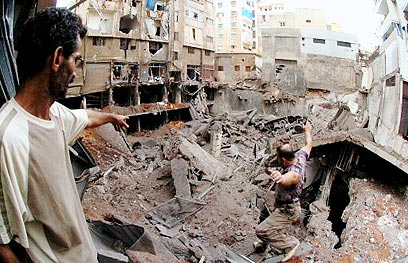Israel should threaten Lebanon, not Hezbollah
Giora Eiland/Ynetnews/Published: 01.30.15/Israel Opinion
Op-ed: Deterrence is only effective as long as the other side understands that a war will lead to the destruction of Lebanon and will not inflict damage only on the Shiite organization.
While I write this column, it is still unclear how the incident which began Wednesday afternoon on Mount Dov will develop, but from the nature of the operation, I can cautiously estimate that Hezbollah is not interested in a full escalation.
And it’s not because it doesn’t have an impressive military ability. Despite its serious losses in Syria, the organization’s rocket arsenal – which is its main weapon – has not been affected at all. Moreover, compared to 2006, it has only grown stronger: It has more missiles, they have a longer range, and their destruction ability and accuracy level are higher. So why isn’t Hezbollah interested in an escalation? It’s not interested mainly because this is not seen as legitimate in Lebanon. While there is full legitimization in Lebanon for an attack against Israel – from Syria or from Lebanon – there is no legitimization for an act which will lead to heavy destruction in the country.
In other words, the deterrence vis-à-vis Hezbollah is only effective as long as the other side understands that a war will lead to the destruction of Lebanon and will not inflict damage only on Hezbollah. Israel’s major mistake in the Second Lebanon War was the decision to fight Hezbollah alone and leave the Lebanese government, the Lebanese army and the country’s infrastructures out of the game. The result was a battle which lasted 33 days and claimed a heavy price and damage from the Israeli side. But this strategic mistake was not even mentioned in the report released by the Winograd Commission, which investigated that war.
What if we wage the third Lebanon war according to that same perception? The result will likely be even worse than the result in 2006. To make things clear: Israel cannot defeat Hezbollah without paying an unbearable price in casualties and damage. On the fundamental level, a state cannot defeat an efficient guerilla organization if the three following conditions exist: The enemy is on the other side of the border; the organization enjoys the full protection of a state; and the protecting state is immune to any response.
The conclusion, therefore, is clear: If the fire from Lebanon continues and we decide that this calls for a broad Israeli response – it should be a declared war against Lebanon. Fortunately, no one wants to see Lebanon destroyed – neither Syria nor Iran nor Saudi Arabia, the United States and France, which have invested a lot in the country’s infrastructure. As the fear of destruction in Lebanon becomes more reliable, it will achieve real deterrence and prevent an all-out conflict. If the conflict does begin in any event, the threat to destroy Lebanon will lead to a ceasefire within three days, rather than 33 days.
The claim that it’s not the Lebanese government fault and that it cannot force Hezbollah to do anything is wrong and irrelevant. The relevant thing is that a threat to Lebanon can create real deterrence, because even Hezbollah, as a political organization, is concerned about causing heavy damage to its country. Some will say that this strategy is impossible because “the world won’t allow it,” but that is a shallow statement. The world’s countries, and definitely the US, will allow such an operation given two conditions.
The first condition is that we simply tell them that we have no ability to defeat Hezbollah, and if they think it’s possible they should tell us how. From my experience from conversations with senior military officials and important American politicians, far-reaching support can be obtained when things are presented seriously and professionally. The second condition is that the professional explanation of why this is the recommended way should be presented in advance, not during the fighting. In fact, we had eight and a half years to make this case. It’s a shame that even in these past few hours we are still issuing threats to Hezbollah instead of relaying messages to the right address – the Lebanese government.
**Major-General (res.) Giora Eiland is a former head of Israel’s National Security Council.



















